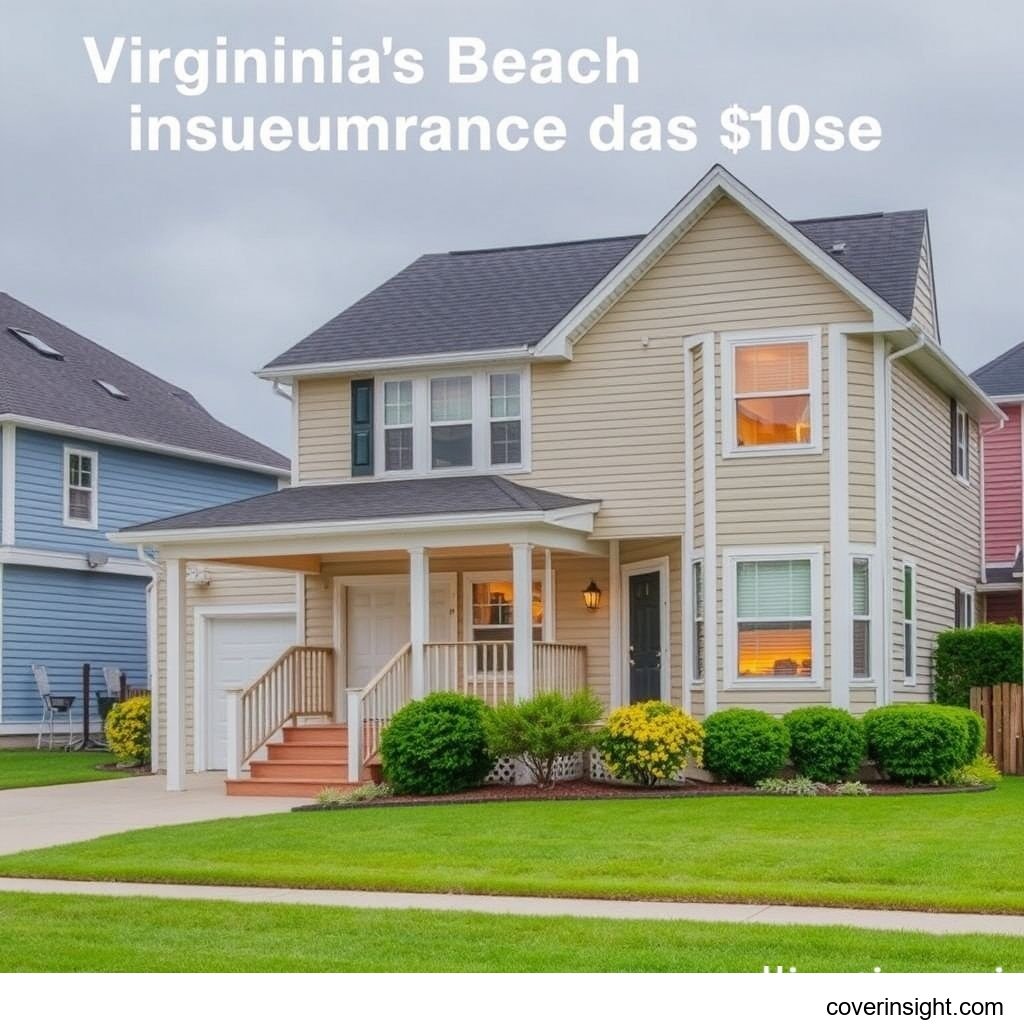Unlock Affordable Home Insurance in Virginia Beach 2025
Introduction
As we navigate 2025, the cost of home insurance across the United States continues to be a significant concern for homeowners. For many, it's not just a line item on the budget; it's a vital safety net, protecting one of their most valuable assets. With an evolving climate and shifting economic landscapes, understanding your policy and finding affordable coverage is more crucial than ever, especially in coastal areas like Virginia Beach. Here, the unique blend of beautiful beachfront living and potential environmental risks makes smart home insurance choices paramount.
Coverage Details
Navigating the intricacies of home insurance can feel like deciphering a foreign language, but understanding what's included and what's not is key to protecting your investment.
What’s Included
A standard homeowners insurance policy, often referred to as an HO-3, is designed to cover a broad spectrum of perils. Typically, it provides dwelling coverage, protecting the physical structure of your home against covered events like fire, windstorms, and vandalism. Beyond the walls, personal property coverage safeguards your belongings, from furniture to electronics, whether they're inside your home or even if they're stolen while you're on vacation.
Crucially, liability coverage is a cornerstone, offering protection if someone is injured on your property and you're found responsible, or if you accidentally cause damage to someone else's property. And let's not forget loss of use coverage, which can be a lifesaver, covering additional living expenses (like hotel stays and meals) if your home becomes uninhabitable due to a covered loss. For those looking to dive deeper into general US home insurance guidelines, exploring resources like "US Insurance Home" can provide a broader context.
Common Exclusions
While comprehensive, standard policies don't cover everything. It's often said, "The devil is in the details," and exclusions are where many homeowners get tripped up. The most notable exclusions are typically flood and earthquake damage. Given Virginia Beach's coastal location, this is particularly important to grasp. Homeowners here often need a separate flood insurance policy, usually through the National Flood Insurance Program (NFIP), to protect against rising waters.
Other common exclusions include damage from neglect or poor maintenance, war, nuclear hazards, and intentional acts by the homeowner. Sinkholes might also be excluded depending on your policy and state. It’s always wise to review your specific policy documents carefully to avoid any unwelcome surprises down the road.
Cost Analysis
The price of peace of mind often comes with a tag, and home insurance premiums are no exception. Understanding what drives these costs can empower you to find better deals.
Price Factors
Several elements conspire to determine your home insurance premium. Your home's location is paramount, especially in Virginia Beach, where proximity to the coast and flood zones significantly influences rates. According to data from the Virginia Department of Energy (formerly Virginia Department of Mines, Minerals and Energy), coastal Virginia faces substantial hurricane risk, which naturally pushes up premiums for properties in vulnerable areas. The age and construction materials of your home also play a big role; older homes or those with less resilient materials might cost more to insure.
Your claim history can certainly make a difference – a history of frequent claims often leads to higher premiums. Insurers also look at your credit score, using it as an indicator of financial responsibility. The deductible you choose (the amount you pay out-of-pocket before insurance kicks in) and your desired coverage limits also directly impact your premium. For instance, raising your deductible from $500 to $1,000 can significantly lower your monthly payment.
Saving Tips
Finding affordable home insurance in Virginia Beach isn't a pipe dream; it's achievable with a bit of savvy. One of the simplest and most effective strategies is bundling policies. Many insurers offer discounts when you combine your home and auto insurance, which can lead to substantial savings, often up to 15-20%. Think of it as a loyalty bonus for being a good customer.
Consider increasing your deductible, if financially feasible. While it means more out-of-pocket in the event of a claim, it can dramatically lower your annual premium. Investing in home improvements that reduce risk, such as installing a new roof, upgrading electrical systems, or even reinforcing against hurricane winds, can also earn you discounts. Modern security systems and smoke detectors are often rewarded with lower rates.
Maintaining a good credit score is also beneficial, as insurers often view it as a sign of lower risk. Most importantly, don't just stick with the first quote you get. Shop around and compare offers from multiple providers. Websites and independent agents can help you compare apples to apples. And don't forget to ask about all available discounts – you might be surprised by what's on offer, from senior discounts to non-smoker incentives. For deeper insights on managing costs specifically in your area, consider exploring "Virginia Beach Home Insurance Cost: Smart Savings for 2025".
FAQs
How much does home insurance cost?
The cost of home insurance varies widely, making a single national average somewhat misleading. In Virginia Beach, given its coastal exposure, average premiums can range significantly based on individual property characteristics and risk factors. It's not uncommon to see annual premiums from $1,200 to over $3,000, but only a personalized quote can give you an accurate figure.
What affects premiums?
Premiums are influenced by a cocktail of factors: your home's location (especially coastal proximity and flood risk in Virginia Beach), its age, construction materials, your personal claim history, credit score, the deductible you select, and the specific coverage limits you choose. Even the presence of safety features like fire alarms or security systems can play a part.
Is it mandatory?
While no state law mandates home insurance, it's virtually mandatory if you have a mortgage. Lenders require you to carry coverage to protect their investment in your home. Without it, they could force-place coverage on you, which is typically more expensive and offers less protection.
How to choose?
Choosing the right policy involves balancing cost with comprehensive coverage. Start by assessing your specific needs and risks (e.g., do you need flood insurance in Virginia Beach?). Then, gather quotes from several reputable insurers. Compare not just the premium, but also the coverage limits, deductibles, and exclusions. Look up customer reviews and check the financial strength ratings of companies. Resources from the "National Association of Insurance Commissioners" or your "State Insurance Departments" can provide valuable consumer guides and complaint data to help inform your decision. For general information on insurance resources, consider looking at "Insurance Resources Global".
Consequences of no coverage?
The consequences of not having home insurance can be financially devastating. If a disaster strikes – a fire, a severe storm, or a liability claim – you would be personally responsible for all repair costs, medical bills, and legal fees. For homeowners with a mortgage, lacking coverage is a breach of your loan agreement, potentially leading to forced-place insurance or even foreclosure. It's simply not a risk worth taking.
Author Insight & Experience
Based on my experience living in coastal Virginia, I've seen firsthand how unpredictable the weather can be and how quickly a home can go from being a sanctuary to a financial burden without proper protection. As someone who's navigated the insurance landscape here, my professional opinion leans heavily on proactive planning. Don't wait for hurricane season to begin assessing your coverage. Get ahead of the game, understand your options, and don't hesitate to ask every question under the sun. Just as you might consult a comprehensive government portal for health-related decisions on "Healthcare.gov", robust resources exist for home insurance, and taking the time to educate yourself now can save you a world of trouble—and a significant amount of money—down the line.







Comments